What’s going on in Quebec now .. progress since FLQ terrorism and October 1970?
May 10th, 2006 | By Citizen X | Category: Canadian Provinces Observers of the new Western quiet revolution in Canadian federal politics have now had time to catch a little breath. And it seems increasingly apparent that, yet again, the most surprisingly ironic things are happening in Quebec.
Observers of the new Western quiet revolution in Canadian federal politics have now had time to catch a little breath. And it seems increasingly apparent that, yet again, the most surprisingly ironic things are happening in Quebec.
It shouldn’t be surprising that Stephen Harper’s first Conservative minority budget will be sailing through Parliament this evening, compliments of Gilles Duceppe and the sovereigntist Bloc Quebecois. Many prophets over the past few years have predicted that the only hope for a workable Conservative government in Ottawa would be some kind of Conservative-BQ alliance.
But hardly anyone altogether believes such prophecies in Canada, even when they come true. And the still quite surprising good news, some will say, is that the Conservative-BQ alliance which has come to pass is not quite as unholy as many had feared.
As summarized by Lysiane Gagnon, who has been trying to explain Quebec to readers of the Globe and Mail for a great many years: “The reason why the Bloc Qubcois supports the Harper government’s budget was clearly spelled out in a CROP poll that appeared in La Presse on the very day of the presentation of the budget. The Conservatives are making huge inroads in Quebec and are now virtually neck and neck with the Bloquistes – an astonishing turn of events … ”
More provincial autonomy and/or a new francophone right-wing mood?
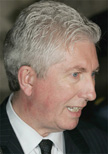 Ms. Gagnon offers one succinct explanation of the gathering new wave in la belle province -Â Conservatives 34% in the recent CROP poll, Bloc Quebecois 31% [ * see bottom of article below * ] – Â in three paragraphs:
Ms. Gagnon offers one succinct explanation of the gathering new wave in la belle province -Â Conservatives 34% in the recent CROP poll, Bloc Quebecois 31% [ * see bottom of article below * ] – Â in three paragraphs:
“Mr. Duceppe was all smiles when he praised the Flaherty budget, but he must have been boiling inside, for the sovereigntists have been caught at their own game. They find themselves forced to applaud a Conservative initiative that might eventually deprive them of their main political weapon.
“The sovereigntists have been claiming for six years that the unresolved fiscal imbalance was a major reason for secession, so sure were they that the Liberals would be in power forever and that nothing would be done to solve the problem. But everything changed when the Conservatives took over with a platform aimed at more autonomy for the provinces.
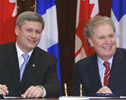 “If Mr. Harper is able to strike a deal with the provinces on a credible plan to rebalance the federation, he will have dealt a very hard blow to the sovereigntists. This would help him win more seats in Quebec at the expense of the Bloc in the next federal election, while also considerably increasing the chances for the embattled Liberal government of Jean Charest to win the next provincial election.”
“If Mr. Harper is able to strike a deal with the provinces on a credible plan to rebalance the federation, he will have dealt a very hard blow to the sovereigntists. This would help him win more seats in Quebec at the expense of the Bloc in the next federal election, while also considerably increasing the chances for the embattled Liberal government of Jean Charest to win the next provincial election.”
At the same time, another recent Globe and Mail report on Quebec, by the always interesting Tu Thanh Ha, points to some potential deeper complexities: “Since Mr. Harper’s breakthrough in January’s federal election, observers are wondering if the long polarization between federalists and separatists in Quebec politics has masked a growing conservatism in the population.
“Their province saddled with high debt, high taxes and an aging population, Quebeckers are increasingly aware that tough choices are ahead. Last year [former provincial premier] Mr.[Lucien] Bouchard joined 11 other prominent Quebeckers in a much-publicized manifesto challenging many of Quebec’s big-government orthodoxies.”
Are fresh Meech Lake reveries what Stephen Harper really wants?
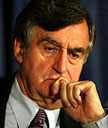 As evidence of just how potentially exotic Quebec current events are becoming, Tu Thanh Ha goes on: “if Quebeckers are conscious that they will soon face the equivalent of a visit to the dentist … [Quebec Liberal premier] Mr. Charest isn’t the right dentist.” And neither, Ms. Gagnon has already reminded us, is Andr Boisclair, the new leader of the senior sovereigntist Parti Quebecois in Quebec provincial politics – which “has been sliding in the polls – to 36 per cent, according to CROP, from 50 per cent in December.”
As evidence of just how potentially exotic Quebec current events are becoming, Tu Thanh Ha goes on: “if Quebeckers are conscious that they will soon face the equivalent of a visit to the dentist … [Quebec Liberal premier] Mr. Charest isn’t the right dentist.” And neither, Ms. Gagnon has already reminded us, is Andr Boisclair, the new leader of the senior sovereigntist Parti Quebecois in Quebec provincial politics – which “has been sliding in the polls – to 36 per cent, according to CROP, from 50 per cent in December.”
So another recent poll has shown that “former Parti Qubcois premier Lucien Bouchard would handily win the next [Quebec provincial] election if he returned to politics for a right-wing party such as Mario Dumont’s Action dmocratique du Qubec.” Or, according to University of Sherbrooke political scientist Jean-Herman Guay: “The electorate is volatile, so much so that it is a purely hypothetical party that’s catching on.”
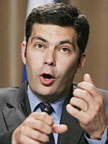 Meanwhile, M. Dumont’s ADQ is not of course so hypothetical for him. He has already called for “a coalition for change, a coalition that will be wide open to all Quebec leaders who would want to join in.” And: “He later told delegates at an ADQ general council that it was time for Quebec to seek constitutional changes to gain more autonomy.”
Meanwhile, M. Dumont’s ADQ is not of course so hypothetical for him. He has already called for “a coalition for change, a coalition that will be wide open to all Quebec leaders who would want to join in.” And: “He later told delegates at an ADQ general council that it was time for Quebec to seek constitutional changes to gain more autonomy.”
Two headlines from Le Devoir over the past few days suggest some further complex progress here: “L’avenir du Qubec – Dumont prne le beau risque de l’autonomie,” and then: “Dumont reoit de bons chos Ottawa.” (On the other hand the Globe and Mail has been somewhat less encouragingly reporting: “No constitutional talks, Quebec Tories tell Bloc.”)
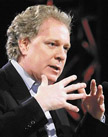 Meanwhile, again, as Ms. Gagnon has also noted: “Mr. Harper is quickly delivering on his promise to grant Quebec a permanent seat within the Canadian delegation at UNESCO. Voting against a government that is showing such good will toward Quebec would be suicidal for the Bloc” [Quebecois in Ottawa, led by Gilles Duceppe].”
Meanwhile, again, as Ms. Gagnon has also noted: “Mr. Harper is quickly delivering on his promise to grant Quebec a permanent seat within the Canadian delegation at UNESCO. Voting against a government that is showing such good will toward Quebec would be suicidal for the Bloc” [Quebecois in Ottawa, led by Gilles Duceppe].”
Two further headlines from Le Devoir over the past few days suggest some still further progress here too: “Le Qubec l’UNESCO – Gilles Duceppe et toute l’opposition dus de l’entente Harper-Charest … C’tait une stratgie lectoraliste, a dnonc le chef du Bloc,” and then “Le Qubec l’UNESCO – Un Meech des relations internationales, estime Gil Rmillard.” (I.e., M. Rmillard, an old provincial apostle of Brian Mulroney’s failed Meech Lake Accord of the late 1980s, which would have constitutionally recognized Quebec as a “distinct society within Canada,” is starting to get hopeful again.)
Remembering the October Crisis in 1970 … Canada’s own terrorist adventure
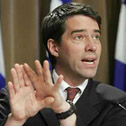 Who knows where all this apparent new (if still rather confused) ferment in Quebec politics will finally lead both Quebec and Canada? It could of course turn into something just too complexly exotic for Prime Minister Harper to manage across the country with any hope of real success.
Who knows where all this apparent new (if still rather confused) ferment in Quebec politics will finally lead both Quebec and Canada? It could of course turn into something just too complexly exotic for Prime Minister Harper to manage across the country with any hope of real success.
But at least for those outside Quebec who insist on seeing the glass half-full, it could also be viewed as somewhat encouraging – regardless of what it may finally mean for the career of Stephen Harper and his new Conservative minority government of Canada. And for those who have been watching Quebec politics from west of the Ottawa River since the heady 1960s, there are some vague hints that it just might be turning more interesting again – as it has arguably been historically, whenever Canadian politics at large has become more interesting.
 This is at least meant to segu into another current item in the Canadian news, that suggests (from the glass-half-full perspective) just how comparatively well the Canada and Quebec issue has progressed since way back when. According to the Globe and Mail on Monday, May 8: “The Canadian judge heading the Air-India inquiry is being asked by the Stephen Harper government to consider new ways to try terrorism suspects … ”
This is at least meant to segu into another current item in the Canadian news, that suggests (from the glass-half-full perspective) just how comparatively well the Canada and Quebec issue has progressed since way back when. According to the Globe and Mail on Monday, May 8: “The Canadian judge heading the Air-India inquiry is being asked by the Stephen Harper government to consider new ways to try terrorism suspects … ”
Perhaps because it is so relatively long ago now for younger people, current public debate on combating “international terrorism” in Canada seldom acknowledges or otherwise remembers that Canada rather successfully lived through its own unique ordeal with domestic terrorism, during the early days of the present Quebec sovereigntist movement in the 1960s.
 All this finally came to a head in the “October Crisis” of 1970, when Quebec independentist terrorists kidnaped the British trade commissioner James Cross in Montreal, and then kidnaped (and finally murdered) the Quebec cabinet minister, Pierre Laporte. Which prompted federal Prime Minister Pierre Trudeau to invoke the War Measures Act, and briefly declare what amounted to martial law in Canada (or at least in Ottawa and Montreal).
All this finally came to a head in the “October Crisis” of 1970, when Quebec independentist terrorists kidnaped the British trade commissioner James Cross in Montreal, and then kidnaped (and finally murdered) the Quebec cabinet minister, Pierre Laporte. Which prompted federal Prime Minister Pierre Trudeau to invoke the War Measures Act, and briefly declare what amounted to martial law in Canada (or at least in Ottawa and Montreal).
As it happens, the CBC Archives website has some excellent historical material on “The October Crisis: Civil Liberties Suspended.” It includes a poignant audio of a “francophone caller to CBC Radio’s Double Take” who is “is frustrated with English Canada” – and an engrossing six-minute clip of Trudeau’s celebrated “Just Watch Me” TV interview on the steps of Parliament. (The chattering classes, in both official languages, did not like what Trudeau did then. But many among the nascent Canadian people of the later 20th century did. And anyone who wonders why Pierre Elliott Trudeau, with all his faults, remains such an impressive Canadian prime minister might especially find this October 1970 real-life TV drama helpful.)
 * Two more recent polls reported on May 9 show the Conservatives doing not quite so well, but still surprisingly good in Quebec – and well ahead of the Liberals in Canada at large.
* Two more recent polls reported on May 9 show the Conservatives doing not quite so well, but still surprisingly good in Quebec – and well ahead of the Liberals in Canada at large.

